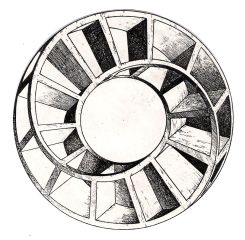For Beirut I write . . .
Like veiled women,
years listen at doors,
seasons close their eyelids,
softly touch her broken fragments,
and the burnt soutane of her walls.
The wind alone enters into rooms and murmurs softly.
No one interrupts its monologue.
For Beirut I write . . .
The chalky side of the empty market,
the barked wire planted in the blood stained quarters of the latest battles,
the black opening of galleries on dark cliffs.
Signs engraved in passage ways,
carved within buildings,
the grey dust which speaks for the anger of fire.
Behind a shutter two tearless eyes.
A far away voice recites prayers.
A worried cat removes a bit of its prey.
For Beirut I write . . .
How trivial it would be for old crews to fix their silks over this city sunk in her misery.
Let memory manage its gold over splinters,
make wounds guilty,
humiliate the kidnapped Capital,
and burden her with regrets.
For Beirut I write . . .
To call again,
to love in vain,
to lose one's self and sleep in this ship betrayed by its song and its lust for life.
For Beirut I write . . .
Her dress made of a thousand alliances,
her chequered fabric,
her dark arteries,
her orders at night,
and her stones reddened each day by her light.
For Beirut I write . . .
So that I watch her as she comes back to life,
as she attends to her chores with time,
with death,
with the denial of absence.
I watch her as she invents this sand
which puffs and covers up with the same whiteness the tombstones and the cornfields.
Claire Gebeyli (B. 1930) was born in Alexandria, Egypt, of Greek origin. She married a Lebanese and lived most of her life in Lebanon. She is currently an Associate Editor of the Lebanese French daily, L'Orientle Jour, where she is also a regular columnist, combining poetry and journalism to create a unique editorial style.

